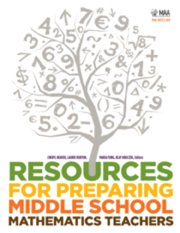Book contents
- Frontmatter
- Preface
- Contents
- I Programs for Middle School Teachers
- 1 Preparing Middle Grades Mathematics Teachers at Georgia College & State University
- 2 The Mathematics for Middle School Teachers Program at Western Oregon University
- 3 Connecting Middle School Mathematics with College Mathematics: A Core of Mathematics Courses for Middle Grade Mathematics Teachers
- 4 The Middle School Program at the University of Wisconsin Oshkosh
- B In-service Training Programs
- II Courses for Middle School Teachers
- B Geometry
- C Number Theory and Abstract Algebra
- D Precalculus and Calculus
- E Probability and Statistics
- F Combination Courses
4 - The Middle School Program at the University of Wisconsin Oshkosh
from I - Programs for Middle School Teachers
- Frontmatter
- Preface
- Contents
- I Programs for Middle School Teachers
- 1 Preparing Middle Grades Mathematics Teachers at Georgia College & State University
- 2 The Mathematics for Middle School Teachers Program at Western Oregon University
- 3 Connecting Middle School Mathematics with College Mathematics: A Core of Mathematics Courses for Middle Grade Mathematics Teachers
- 4 The Middle School Program at the University of Wisconsin Oshkosh
- B In-service Training Programs
- II Courses for Middle School Teachers
- B Geometry
- C Number Theory and Abstract Algebra
- D Precalculus and Calculus
- E Probability and Statistics
- F Combination Courses
Summary
Introduction
“The key to distinguishing the knowledge base of teaching lies at the intersection of content and pedagogy, in the capacity of a teacher to transform the content knowledge he or she possesses into forms that are pedagogically powerful and yet adaptive to the variations in ability and background presented by the students.” —
Lee S. Shulman, 1986 [20]As mathematicians and educators, we are faced with the challenge of preparing future generations of middle grades teachers of mathematics. This is a daunting task indeed, given that many prospective and practicing teachers reveal a paucity of mathematics content knowledge [1, 11] and have overtly authoritarian beliefs about the nature of mathematical behavior [18, 19]. We are left to wonder how to best design our programs for prospective middle grades teachers. Should we emphasize mathematics content or stress mathematics methods and connections to the school curriculum? What forms should our courses take and which faculty members are best qualified to teach them?
At the center of this problem lies a tension between the education and the mathematics communities over the types of mathematical knowledge that teachers need. The research literature distinguishes several components: content knowledge, knowledge of learning and the learner, general pedagogical knowledge, and pedagogical content knowledge. A synthesis of this literature can be found in [6], where the authors propose that teacher knowledge is both situated and changeable.
Information
- Type
- Chapter
- Information
- Publisher: Mathematical Association of AmericaPrint publication year: 2013
